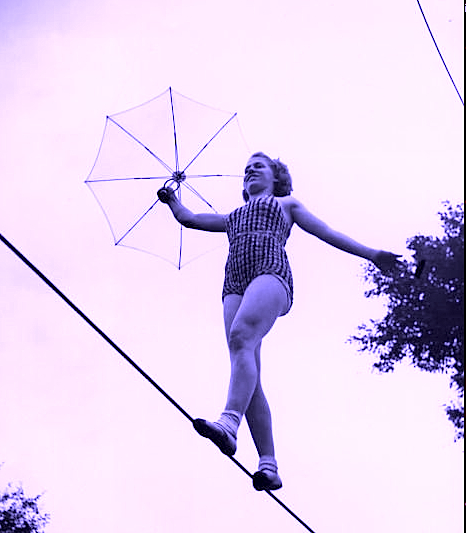All right, I’m resigned to it: there is evidently a vast cosmic conspiracy to delay, if not actually prevent, my tackling the thorny issue of how to write a synopsis to accompany a query or submission. This time, as often happens, I got sidetracked by a really good question from a reader. Quoth obviously great query-writer Susan:
My question today, though not directly related to referrals, does have to do with industry etiquette. I’ve read your posts about exclusives, but can’t quite ferret out the answer to my current situation.
Last week, I granted a 3-week exclusive for a partial to Agent A, and yesterday I got an e-mail from Agent B requesting a (nonexclusive) full and another one from Agent C requesting a (nonexclusive) partial.
What’s the polite thing to do? Sit tight until the three weeks is up before responding to Agents B and C? Tell Agents B and C I’ll be happy to send these when the period of exclusivity with Agent A has expired?
Although truth compels me to say that I actually have written one general and two specific posts this year on this very subject (here is one on juggling exclusive and non-exclusive requests simultaneously, and here is one on dealing with mutually exclusive requests), I am glad that Susan asked (I’m even happier to hear that she set a time limit on Agent A’s exclusive, but that’s something I’ll explain later in this post.)
Why am I so pleased to deal with the topic again? Well. since writer friends ask me this very question — what should a writer who already has submissions out to agents do if a newly-responding agent asks for an exclusive? — privately a dozen or so times per year, in addition to the many, many times I am asked in the comments here, I’m inclined to believe that when aspiring writers agree to an exclusive, they don’t necessarily understand what it actually entails.
An exclusive, for those of you new to the concept, is when a writer agrees to allow an agent a specific amount of time to consider representing a particular manuscript, during which no other agent will be reviewing it. In practice, both the agent and the writer agree to abide by certain rules during the specified period:
– ONLY that agent will have an opportunity to read the materials;
– no other agent is already looking at it;
– the writer will not submit it anywhere else;
– in return for this significant advantage (which, after all, pulls the manuscript out of competition with other agents), the agent will make a legitimate effort to read and decide whether or not to offer representation within the specified time period.
Doesn’t seem all that complicated an arrangement, does it? Yet hardly a month goes by when some well-meaning but confused exclusive granter doesn’t tap me on the shoulder (physically or electronically) to ask, “Um, Anne, do you remember that request for an exclusive I was so excited about a week and a half ago?” (Or a month and a half, or six months.) “I’ve heard from another agent. What should I do?”
If the writer specified a time limit on the exclusive, the answer is very simple: if less than that amount of time has passed, don’t send the manuscript to anyone else until it has; if more time has passed, what’s stopping you? When the writer HASN’T set such a limit, the ethics are more nebulous.
See why I was so pleased to hear that Susan had specified that Agent A had an exclusive for only three weeks?
To figure out where exclusive-granting writers run into ethical dilemmas, let’s look at the phenomenon from the other side of the agreement. Generally speaking, agents will request exclusives for one of three reasons: either they fear that there will be significant competition over who will represent the project, they don’t like to be rushed while reading, or it is simply the agency’s policy not to compete with outside agencies, ever.
Do I feel some of you out there getting tense, doing the math on just how many years (if not decades) it could take to make it through your list of dream agents if you had to submit to them one at a time? Relax, campers: requests for exclusives are actually fairly rare.
Why rare? Well, the first kind of exclusive request, the one Agent D (to continue through Susan’s alphabet of competitive agents) might use to prevent Agents E-R from poaching your talents before D has had a chance to read your manuscript (hey, D’s desk is already chin-deep in paper), tends to be reserved for writers with more than just a good book to offer. Celebrity, for instance, or a major contest win.
Basically, the agent is hoping to snap up the hot new writer before anybody else does. Or before the HNW realizes that s/he might prefer to be able to choose amongst several offers of representation. Since pretty much every respectable agency offers the same service, such choices are often made on the basis of connections, how well-established the agency is, or even how well the writer and the agent happen to hit it off.
If you suddenly find yourself the winner of a well-respected literary contest or on the cover of People, remember this: just because an agent asks for an exclusive does not mean you are under any obligation to grant it.
Oh, pick your chin up off the floor. If your work is in demand, it’s not necessarily in your best interest to sign with the first agent who makes an offer — you will want the one with the best track record of selling books like yours, right?
Chant it with me now, long-time readers: you do not want to land just any agent; you want the best agent for YOUR work.
As exciting as a request for an exclusive may be, it does tie the writer’s hands, for precisely the reason Susan mentions: throughout the duration of the exclusive, the writer agrees not to show the manuscript to any other agent. If, as in Susan’s case, other agents are also interested, this can mean a substantial delay in getting the manuscript onto their desks — and if Agent A offers to represent it, B and C may not see it at all.
But I’m getting ahead of myself, amn’t I? For the moment, what I would like for you to take from this situation as discussed so far are two things — no, make that three:
1) As flattering as a request for an exclusive is to an aspiring writer, granting it is optional;
2) Since by definition, a writer cannot submit to other agents during the exclusive period — yes, even if the writer queried the others first — it’s ALWAYS a good idea to set a time limit;
3) Since granting it limits the writer’s options, it’s best reserved for situations where one’s top-choice agents are interested in the book.
Why limit it to your favorite picks? Try to think of granting an exclusive as if you were applying for early admission to an Ivy League school: if the school of your dreams lets you in, you’re not going to want to apply to other universities, right? By applying early, you are saying that you will accept their offer of admission, and the school can add you to its roster of new students without having to worry that you’re going to go to another school instead.
It’s a win/win, in other words.
So if the best agent in the known universe for your type of writing asks for an exclusive, you might want to say yes. But if you have any doubt in your mind about whether Harvard really is a better school for your intended studies than Yale, Columbia, or Berkeley — to mix my metaphors again — you might want to apply to all of them at the same time, so you may decide between those that admit you.
My point is, if you are asked for an exclusive because your work is sought-after, it is up to you whether you would prefer to go steady right off the bat or date around a little. Got it? (If not, I can keep coming up with parallel cases all day, I assure you. Don’t make me start sending you to past posts.)
That doesn’t mean you should necessarily say no to this type of exclusivity request, but if you say yes, set a reasonable time limit on it, so you don’t keep your book off the dating market too long. This prudent step will save you from the unfortunately common dilemma of the writer who granted an exclusive six months ago and still hasn’t heard back.
Yes, in response to that gigantic collective gasp I just heard out there: one does hear rumors of agents who ask for exclusives, then hold onto the manuscript for months on end. Within the past couple of years, such rumors have escalated astronomically.
Set a time limit.
Susan’s choice of three weeks was a perfectly legitimate length. No need to turn the time limit into an experiment in negotiation: simply include a sentence in your submission’s cover letter along the lines of I am delighted to give you an exclusive look at my manuscript, as you requested, for the next three weeks. Simple, direct — and trust me, if the agent has a problem with the time you’ve specified, s/he’ll contact you to ask for more.
Negotiation is not possible with the other type of exclusive request, the kind that emerges from an agency that only reviews manuscripts that no one else is; the writer is not offered a choice in the matter. Consequently, a request for an exclusive from these folks is not so much a compliment to one’s work (over and above the sheer desire to read some of it, that is) as a way of doing business.
In essence, these agencies are saying to writers, “Look, since you chose to query us, you must have already done your homework about what we represent — and believe us, we would not ask to see your manuscript if we didn’t represent that kind of writing. So we expect you to say yes right away if we make you an offer.”
Why might such a stance be advantageous for an agency to embrace? Well, it prevents them from ever having to experience the fear associated with the first type of exclusive request: if you send them pages, they may safely assume that you won’t be calling them in a week to say, “Um, Agent Q has just made me an offer, slowpoke. I still would like to consider your agency, so could you hurry up and finish reading my manuscript so you can give me an answer? As in by the end of the week?”
Okay, so you wouldn’t really be that rude. (PLEASE tell me you wouldn’t be that rude.) But let’s face it, agents who don’t require exclusive submissions do receive these types of calls a fair amount. And nobody, but nobody, reads faster than an agent who has just heard that the author of the manuscript that’s been propping up his wobbly coffee table is fielding multiple offers.
Agencies who demand exclusivity are, by definition, unlikely to find themselves in a similar Oh, my God, I have to read this 400-page novel by tomorrow! situation. You have to admit, after even the third or fourth panicked all-nighter, exclusives might start to look like a pretty good policy.
What does the writer get in return for agreeing not to submit to others for the time being? Well, not a heck of a lot, unless the agency in question is in fact the best place for his work. But if one wants to submit to such an agency, one needs to follow its rules.
Fortunately, agencies that maintain this requirement tend to be far from quiet about it. Their agents will trumpet the fact from the conference dais. Requires exclusive submissions or even will accept only exclusive queries will appear upon their websites, in their listings in standard agency guides, and on their form replies requesting your first 50 pages.
(Yes, Virginia, positive responses are often form-letters, too, even when they arrive in e-mail form. I sympathize with your shock.)
If they had company T-shirts, in short, there would probably be an asterisk after the agency’s name and a footnote on the back about not accepting simultaneous submissions. If they’re serious about the policy, they’re serious about it, and trying to shimmy around such a policy will only get a writer into trouble.
Do I feel some of you tensing up again? Relax — agencies with this requirement are not very common.
Why? Well, because they require their potential clients to bring their often protracted agent search to a screeching halt while the submission is under consideration, such agencies are, in the long run, more time-consuming for a writer to deal with than others. As a result, many ambitious aspiring writers, cautious about committing their time, will avoid querying agencies with this policy.
Which, again, is a matter of personal choice. Or it is if you happened to notice before you queried that the agency in question had this policy.
Hey, check their T-shirts — and even with such agencies, be up front about how long you will be willing to wait.
So where does this leave Susan and the many other writers out there who have granted exclusives to the first agent who asks, only to find themselves chafing under the agreement down the line, when other agents asked to see the manuscript?
Well, it depends upon two factors: why the agent asked for the exclusive in the first place, and how long it has been since the writer granted it.
If the agent asked for it because her agency will only consider exclusive submissions, then the writer is indeed obligated to hold off on further submissions. If the agreed-upon period has elapsed, you can always contact the agent and ask point-blank if s/he needs more time.
What the writer should NOT do when dealing with an exclusives-only agency is contact the agent, explain that others want to read the work, and ask if it’s okay to submit simultaneously — which, incidentally, is very frequently the writer’s first impulse, if those who contact me on the sly to ask my advice are any indication. Bless their optimistic little hearts, they seem to believe that of only the agent in question understood how eagerly they want to find representation, the agent’s heart would melt.
“Of course, you may indulge in multiple submissions,” s/he would say, tossing candy to the world’s children from Santa’s sleigh. “We were just kidding about that whole exclusives-only thing.”
Not going to happen.
This desire to throw oneself upon the agent’s mercy seems even stronger, if that’s possible, in writers who already have submissions out with other agents, and THEN receive a request for an exclusive from an agent. For many such submitters (who, let’s face it, have a problem most aspiring writers would LOVE to have), the fact of previous submission seems to obviate the agent’s request, or even an exclusives-only agency’s policy.
They couldn’t really mean it in MY case, these writers think.
I hate to burst your bubble, Sparky, but I can assure you that they could — and do. Trying to negotiate one’s way out of this situation only tends to change the representation question from whether the agent likes the writer to whether he really wants to deal with someone who has difficulty following directions.
Don’t believe me? Okay, let’s take a gander at the probable e-mail exchange between agent Clinton and Mehitabel, a writer who already has a submission out to another agent:
Dear Mehitabel:
Thank you for querying me with your novel, TERMINAL INDECISIVENESS. Please send the first fifty pages.
As you may already know, our agency will accept only exclusive submissions. Please enclose a SASE.
Regards,
Clinton McPicky
Dear Clint:
Thank you for your interest in my novel. I would be happy to give you an exclusive, but the fact is, two other agents already have partial manuscripts, and I don’t know when I shall be hearing back from them. I’m really impressed with your agency, though, and I certainly don’t want to knock it out of consideration.
Since it would obviously be impossible for me to give you an exclusive on material that’s already elsewhere, is it okay if I just go ahead and send you what I’ve sent the others?
Mehitabel
Dear Mehitabel:
As I mentioned, my agency only accepts submissions on an exclusive basis.
Clinton
Notice what happened here? Mehitabel tried to shift responsibility for solving her dilemma onto Clinton’s shoulders. (Also, she addressed him by a familiar nickname, rather than the name with which he signed his letter; a small thing, but rather rude.) From her point of view, this made perfect sense: his request had caused a problem, so she asked him to modify his request.
From Clinton’s POV, however, she was asking him to change agency policy for the sake of a single writer who, for all he knows, simply did not bother to check what those policies were before querying. What possible incentive could he have for saying yes?
Got the impulse to quibble out of your system, Mehitabel? Good. Next time, abide by your agreement: allow Clinton an exclusive until the agreed-upon time has elapsed, then inform him that unless he would like an extension upon his exclusive (which you are under no obligation to grant, Hitty), you will be submitting it to the other agents who have requested it.
What’s that you say, Mehitabel? Isn’t Clinton likely to say no at that point? Perhaps, but not necessarily — and you will have done your level best to conduct your submission process honorably.
Everyone out there comfortable with all this? Okay, let’s return to Susan’s situation.
In a case like Susan’s (if I am reading her question correctly), where the writer has an agreed-upon time limit with an agent whose agency does NOT insist upon solo submissions, the resolution again depends upon how much time has elapsed. If the exclusive period is still ongoing, the writer cannot in good conscience send out requested materials to any other agent regardless of whether others requested exclusives in the meantime.
Don’t even consider it. Otherwise, the exclusive would be meaningless, no?
For some reason, the writers who creep into my atelier in the dead of night to ask my advice on the subject almost always seem surprised, or even hurt, by this response. But the situation honestly is pretty straightforward, ethically speaking: the writer agreed to the exclusive, so pretty much everyone in the industry would expect her abide by it.
And as we saw above, contacting everyone concerned to explain the dilemma will not eliminate it; all that will do is tell all of the agents involved that the writer is trying to change the rules. Either trying to renegotiate with A at this point or telling the others they will need to wait, will not win the writer points with anybody; it will merely look as though you didn’t understand what an exclusive was.
Here’s how I would advise handling Susan’s dilemma: if she hears back from Agent A within the three weeks and he wants to represent you, she has only two options — saying yes without sending out further submissions or saying no and sending out to the others.
If A does make an offer she wishes to accept, she should send a polite note to the other two, saying precisely what happened: another agent made an offer before she could send out the materials they requested. They’ll understand; this happens all the time.
If A doesn’t make an offer within those three weeks, on day 22 (three weeks + 1 day), she should send the requested materials to Agents B and C, along with cover letters explaining that others are looking at it simultaneously. No need to specify who is doing the looking, just that they are.
To deal courteously with A at this point, she should send a letter — paper or e-mail, depending upon how Susan previously had contact with him/her — saying that while A is still her first choice (the implication of an exclusive, always), since the exclusive has now expired, she is now sending out requested materials to other agents.
Again, this happens all the time. If Susan were really nervous about alienating A, she could contact him first, offering to extend the exclusive BEFORE sending out the others, but it’s imperative that A is aware before he makes a timing decision that others are indeed interested.
As long as a writer does what she said she was going to do, she’s unlikely to run into much trouble with an exclusive — but remember, this is an industry where reputations count; in the long run, it’s in your interest every bit as much as the agent’s that you honor the exclusivity agreement, if you grant it.
Frankly, I think most submitters in this situation overreact to the prospect of a comparatively short wait. Because, really, holding off for a few days or weeks is not going to harm the writer’s chances with the other requesting agents. Chances are that they’re reasonable people; after all, it’s not as though they requested the materials, then cleared their schedules for the foreseeable future in order to hold their respective breaths until the submission arrived.
Or, to couch it in today’s example: if Susan hadn’t had the good sense to ask for a time limit, an extended delay might have required explanation, but realistically, agents B and C almost wouldn’t have dropped everything to read the submission before A’s exclusive expired, anyway. She can afford to sit tight.
All this being said, a writer is under no obligation whatsoever to stop submitting or querying other agents while one is reading requested materials. Unless an agent ASKS for an exclusive — and believe me, if an agency requires exclusivity, the member agent interested in your work will tell you so directly — it is NOT expected. In fact, now that the agent-finding market is so fierce, the vast majority of agents simply assume that good writers are querying and submitting widely.
While not continuing to pursue other leads while an agent is perusing your work may seem like a well-deserved break, a reward for successful querying, it’s effectively like applying to only one college per year: you might get in eventually, but it’s a far more efficient use of your time to apply to many simultaneously.
Unless, of course, the school you’re absolutely sure that you want to attend offers you early admission.
So submit widely — and keep those queries and submissions circulating until you land an agent. Just make sure that when you have requested materials out to more than one agent, you tell each that others are looking at it.
Trust me, they’ll want to know, even if they aren’t exclusive-minded. Gives ‘em just a touch of incentive to read faster.
Glancing over the length of this, I am tempted to conclude that while it was an interesting experiment to try to tackle such a huge question in a single post — the easier for readers to find it in the archive, my dears — I probably shan’t do it again. The double-take I just did at the clock informs me not only that it is time to end for today, but that I should probably take tomorrow off to rest my wrists.
Next time, whenever that shall be and universal interference permitting, we’ll move on to synopses, but I make no promises. Blog life has just been too unpredictable of late. Keep up the good work!


















